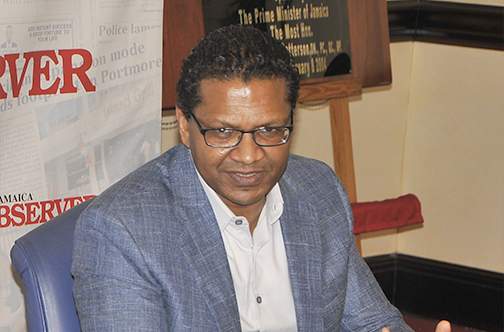With the latest economic projections revealing significant contractions for gross domestic product (GDP) growth over the next quarters into the fiscal year, Jamaica Manufacturers and Exporters Association (JMEA) President Richard Pandohie said the time has come for policies to be implemented to expand and include the productive sector — touting it as one of the industries poised to assist the country with GDP recovery.
Pandohie, in responding to questions posed by the Jamaica Observer last week, said that while the productive sector — inclusive of manufacturing, agriculture, and export — has so far failed to capture the attention of policy-makers, who have based the economy entirely on the service sector, the novel coronavirus pandemic has not only exposed the vulnerabilities but has also highlighted the need for certain changes.
“It is imperative that we move from saying the right things to doing the right things; time to diversify the economic base by implementing policies to expand the productive base and to drive exports,” he told Sunday Finance.
Referring to the findings of the Planning Institute of Jamaica in its recent review of the country’s economic performance — which showed declines of 1.7 per cent for the January-March quarter, up to a 14 per cent growth contraction for the April-June quarter, and a 4-6 per cent range reduction for the fiscal year — Pandohie noted that the manufacturing sector was having one of the highest rates of positive growth performance.
“The manufacturing sector was able to grow by 2.7 per cent in the first quarter of 2020 due to growth in almost all of the major sub-industries and especially due to growth in the petroleum products sub-industry,” he said. “This has now been four quarters of growth that is expected to continue in the second quarter of 2020. This sector is particularly adaptive and resilient as we have seen many manufacturers diversify their product offerings in a short space of time to ensure the needs of the nation are met.”
He said that with the manufacturing sector consistently contributing about 8.5 per cent to GDP and employing more than 9,000 people, this is a sector which cannot be overlooked, given the role it will have to play in the growth recovery agenda.
Commenting on the adverse projections for the economy as a result of the effects brought on by the pandemic and the plummeting of GDP, Pandohie noted the declines as massive — worsened by rising unemployment and business closures.
“There is no doubt,” he said, “that the economy will enter into a recession. The steep decline reflects the deep damage that the coronavirus is wreaking on the economy and truthfully it will likely take two to three years to get back to the pre-COVID GDP level.”
“The reality is that the country cannot afford another quarter with this magnitude of decline, and it is therefore critical that we get the economy going again, but in a responsible manner. We can ill afford to fly the gate and then run the risk of undoing the last three months of collective and personal sacrifice that has seen us bring the COVID-19 to a manageable level,” he said.
The JMEA head further said that while the productive sector cannot replace the contributions of the hotel and business process outsourcing industries as service industries are critical, there now becomes a gnawing need to create policies that will allow for an integrated economy, ensuring in the process that the manufacturing sector will have strong linkages to other sectors such as agriculture, hotels, and restaurants.
“We have had a seat at the table with the COVID recovery task force; we have submitted measures that we consider low-hanging fruits that would be beneficial to the industry and to the country, and we are hoping for a positive outcome,” he said.




Leave A Comment